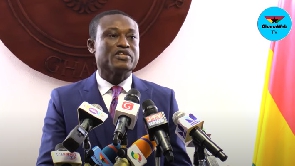 Special Prosecutor, Kissi Agyebeng
Special Prosecutor, Kissi Agyebeng
Media practitioner, Kwame Sefa Kayi, recently questioned the need for an Office of the Special Prosecutor.
On the show, as reported by GhanaWeb on December 10, 2023, the veteran radio personality asked if there is the need for the OSP, given the fact that the country presently has the Office of the Attorney General and the Commission on Human Rights and Administrative Justice (CHRAJ).
“What is the need for the Office of the Special Prosecutor? Did we even need it? We have the Attorney General and the Commission on Human Rights and Administrative Justice (CHRAJ). I know that the office was set up to aid the Attorney General but if the OSP is complaining about not being able to do his job, then what is the relevance of the office?" he quizzed.
Why exactly should such an office exist?
The following details are made available by International Foundation for Electoral Systems (IFES).
The OSP in Ghana was set up in 2018 by an Act of Parliament to investigate and prosecute corruption and corruption related activities of politically exposed persons.
Beyond Ghana's act that established the office, several other international conventions and charters enjoin the country to have an office independent of the Attorney-General to help in the fight against corruption and its related activities.
Ghana currently has signed on several of these international treaties. Some of these treaties are; the United Nations Convention Against Corruption (UNCAC), African Union Convention on Preventing and Combating Corruption (AUCPCC), Economic Community of West African States (ECOWAS)
The others include the Organisation for Economic Cooperation and Development (OECD), United Nations Convention of Organised Crime (UNTOC), Financial Action Task Force and the Anti-Money Laundering and Terrorism Financing Recommendations.
These institutions and their respective conditions make it a requirement for member countries to have an office that is independent of the government, with the sole responsibility of fighting corruption.
Beginning with UNCAC, in 2005, the United Nations Convention Against Corruption (UNCAC), came into force when it was ratified by the minimum required 30 countries. Presently, UNCAC has about 187 members which Ghana is a part of.
The convention requires that once a member country is ratified, they are legally obligated to implement the provisions of the convention into their national legislation.
The convention covers, prevention of corruption, criminalization and law enforcement measures, international cooperation, asset recovery technical assistance, information exchange, mechanisms for monitoring implementation.
Given this provision, a parallel comparison can be made with the functions of the OSP under the Office of the Special Prosecutor Act, 2017 (Act 959).
The UNCAC specifically mentioned that member countries must implement coordinated policies that prevent corruption and designation of a ‘body or bodies’ to coordinate and oversee the implementation of these policies, which cover both the public and private sectors.
Prior to the coming in of the OSP, the same convention, led Ghana to establish institutions like the Financial Intelligence Centre (FIC), Economic and Organised Crime Office (EOCO) formerly known as the Serious Fraud Office.
Ghana joined the Organisation of African Union (OAU) now AU in 1963, for an integrated, prosperous and peaceful Africa, driven by its own citizens and representing a dynamic force in the global arena. To do that, the AU brought the African Union Convention on Preventing and Combating Corruption (AUCPCC), as a model to fight corruption in the respective. Although there is no monitoring or enforcement mechanism and its implementation being voluntary, the convention has led to the Commission on Human Rights and Administration Justice (CHRAJ), the Office of the Special Prosecutor and the recently passed Right to Information Commission.
Other conventions like the United Nations Conventions Organised Crime (UNTOC), adjure Ghana further emboldens the need for an office like that of the OSP.
Article 9 of the convection states “that each state party shall, to the extent appropriate and consistent with its legal system, adopt legislative, administrative or other effective measures to promote integrity and to prevent, detect and punish the corruption of public officials."
Adding on, it states that “each state party shall take measures to ensure effective action by its authorities in the prevention, detection and punishment of the corruption of public officials, including providing such authorities with adequate independence to deter exertion of inappropriate influence on their actions”
Although corruption in Ghana has been a challenge. Governments in and out have made efforts to combat it. But the efforts to combat it have been characterised by sermonisation, exhortations and adhocism. The Office of the Special Prosecutor, under the the constitution of Ghana, 1992, is one of the few offices clad with enough powers to tackle corruption and its related activities head on.
Ghana’s leading digital news platform, GhanaWeb, in conjunction with the Korle-Bu Teaching Hospital, is embarking on an aggressive campaign which is geared towards ensuring that parliament passes comprehensive legislation to guide organ harvesting, organ donation, and organ transplantation in the country.
Click here to follow the GhanaWeb General News WhatsApp channel
NW/AE
You can also watch the latest episode of Everyday People on GhanaWeb TV below: